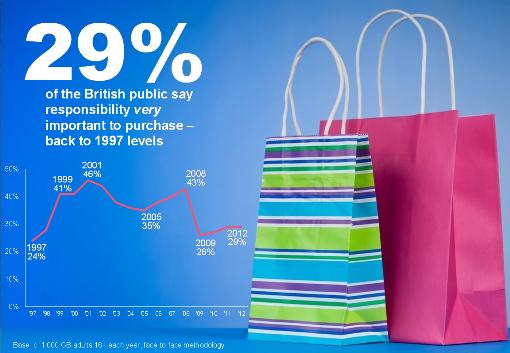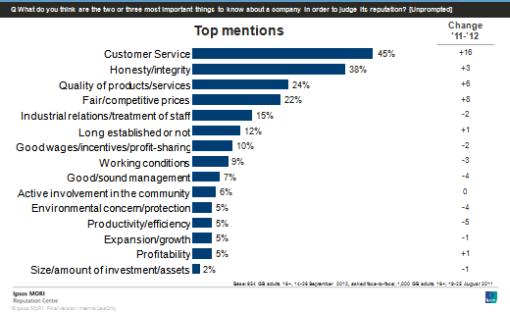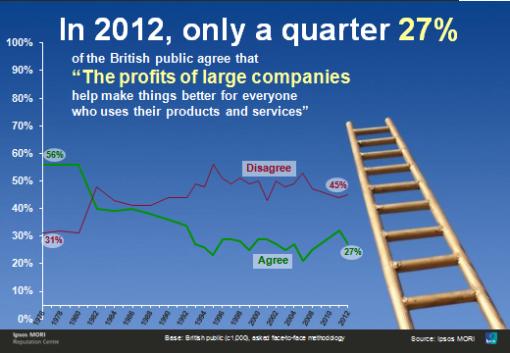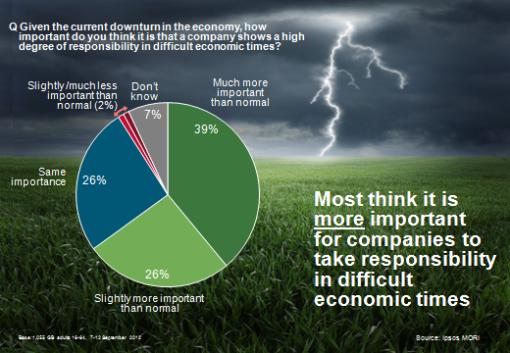Whatever happened to `Corporate Social Responsibility'?
Robert Cumming asks whether Corporate Social Responsibility was just a fad or has been absorbed into everyday culture?
Download the article as a PDF  Corporate Social Responsibility (or CSR) was one of the buzz words in the late 90s, but I haven’t heard anyone talk about it for a long time. Was it just a fad or did it just get absorbed into everyday culture?
CSR wasn’t anything new in the 90s – Robert Owen and George Cadbury had demonstrated a long time ago that pioneers of British industry could have a conscience. However, the phrase ‘Corporate Social Responsibility’ wasn’t actually coined until the 1950’s, and it was only in the 70’s and 80’s that the concept really grew legs as large corporations started to appreciate the importance and influence of those who are affected by their business activities.
Around this time, companies started to include discussion of their activities in annual reports and to state their policy on responsibility issues. Then there was the Nestle boycott in the late 80s and early 90s, demonstrating what could happen if companies didn’t take seriously how their affairs are perceived by the wider public, and from which there were long-term implications for Nestle (73 university unions, 102 businesses and 18 local authorities still refuse to sell Nestle products).
But in the 90s CSR really grew. The well-publicised battle between Shell and Greenpeace over Brent Spar led one of the world’s biggest companies on a mission to improve its image through greater transparency. It commissioned a massive public relations drive to restore public and investor confidence. The jury is still out over whether the campaign was successful. Nevertheless, the campaign awoke the public to the importance of knowing what companies actually do in getting their products to the consumer.
So what happened after that? Despite the boon to the PR industry, public demand for more information and the appointment of a first ever Government Minister for CSR in 2000, the term ‘Corporate Social Responsibility’ seems to have disappeared.
The Ipsos Sustainable Business Monitor, which looks at these issues, has been running for over 20 years. The 2012 survey shows that, on the face of it, public attitudes have changed considerably over this period.
Corporate Social Responsibility (or CSR) was one of the buzz words in the late 90s, but I haven’t heard anyone talk about it for a long time. Was it just a fad or did it just get absorbed into everyday culture?
CSR wasn’t anything new in the 90s – Robert Owen and George Cadbury had demonstrated a long time ago that pioneers of British industry could have a conscience. However, the phrase ‘Corporate Social Responsibility’ wasn’t actually coined until the 1950’s, and it was only in the 70’s and 80’s that the concept really grew legs as large corporations started to appreciate the importance and influence of those who are affected by their business activities.
Around this time, companies started to include discussion of their activities in annual reports and to state their policy on responsibility issues. Then there was the Nestle boycott in the late 80s and early 90s, demonstrating what could happen if companies didn’t take seriously how their affairs are perceived by the wider public, and from which there were long-term implications for Nestle (73 university unions, 102 businesses and 18 local authorities still refuse to sell Nestle products).
But in the 90s CSR really grew. The well-publicised battle between Shell and Greenpeace over Brent Spar led one of the world’s biggest companies on a mission to improve its image through greater transparency. It commissioned a massive public relations drive to restore public and investor confidence. The jury is still out over whether the campaign was successful. Nevertheless, the campaign awoke the public to the importance of knowing what companies actually do in getting their products to the consumer.
So what happened after that? Despite the boon to the PR industry, public demand for more information and the appointment of a first ever Government Minister for CSR in 2000, the term ‘Corporate Social Responsibility’ seems to have disappeared.
The Ipsos Sustainable Business Monitor, which looks at these issues, has been running for over 20 years. The 2012 survey shows that, on the face of it, public attitudes have changed considerably over this period.
 In 2001, half of the public agreed that, when forming a decision about buying a product or service from a particular company or organisation, it was very important that it showed a high degree of social responsibility.
In 2012, it is important to a little over a quarter.
So, is it less important to the public than in the 90s?
Although we might not call it Corporate Social Responsibility any more, the 2012 survey suggests that these issues are actually more important than ever.
In 2001, half of the public agreed that, when forming a decision about buying a product or service from a particular company or organisation, it was very important that it showed a high degree of social responsibility.
In 2012, it is important to a little over a quarter.
So, is it less important to the public than in the 90s?
Although we might not call it Corporate Social Responsibility any more, the 2012 survey suggests that these issues are actually more important than ever.
 When asked what two or three things are most important to know about a company in order to judge its reputation, the public commonly ranks highly issues such as honesty, fair pricing, treatment of staff, working conditions, involvement in the community and concern for the environment. In fact, the public is twice as likely to say ‘honesty and integrity’ is important to know than a decade ago.
When asked what two or three things are most important to know about a company in order to judge its reputation, the public commonly ranks highly issues such as honesty, fair pricing, treatment of staff, working conditions, involvement in the community and concern for the environment. In fact, the public is twice as likely to say ‘honesty and integrity’ is important to know than a decade ago.
 In the 70s, the public felt it was more acceptable for companies to make large profits. However, balance of opinion now clearly disagrees, very few members of the public agree it is enough for companies to just focus on making as much profit as they can and the majority agree that company profits in Britain are generally too high.
In the 70s, the public felt it was more acceptable for companies to make large profits. However, balance of opinion now clearly disagrees, very few members of the public agree it is enough for companies to just focus on making as much profit as they can and the majority agree that company profits in Britain are generally too high.
 The current economic climate is undoubtedly shaping opinion. Most members of the public think it is more important for companies to take responsibility in difficult times, but public opinion does not think it is doing enough. Only 13% agree that ‘most large companies in the UK are working for the long term good of everyone’ and there has been a sharp decline in the proportion who think business generally behaves ethically. The public want more done to address excessive executive pay and corporate tax avoidance.
In conclusion, it seems the terminology might have changed over the last decade (“business sustainability” rather than “corporate responsibility”) and environmental concerns seem to have taken on their own agenda. Nevertheless, the principles behind corporate social responsibility have certainly not gone away. In fact, the public are more demanding than ever. We want companies to act in a way that ensures that people in the future can live well, we want companies to demonstrate what they are doing, we want to know what top people are paid, we want to know that suppliers are treated fairly and we want companies to pay their taxes. A Starbucks anyone?
Check out Our Latest Thinking on current Scottish political and social issues here
The current economic climate is undoubtedly shaping opinion. Most members of the public think it is more important for companies to take responsibility in difficult times, but public opinion does not think it is doing enough. Only 13% agree that ‘most large companies in the UK are working for the long term good of everyone’ and there has been a sharp decline in the proportion who think business generally behaves ethically. The public want more done to address excessive executive pay and corporate tax avoidance.
In conclusion, it seems the terminology might have changed over the last decade (“business sustainability” rather than “corporate responsibility”) and environmental concerns seem to have taken on their own agenda. Nevertheless, the principles behind corporate social responsibility have certainly not gone away. In fact, the public are more demanding than ever. We want companies to act in a way that ensures that people in the future can live well, we want companies to demonstrate what they are doing, we want to know what top people are paid, we want to know that suppliers are treated fairly and we want companies to pay their taxes. A Starbucks anyone?
Check out Our Latest Thinking on current Scottish political and social issues here
 Corporate Social Responsibility (or CSR) was one of the buzz words in the late 90s, but I haven’t heard anyone talk about it for a long time. Was it just a fad or did it just get absorbed into everyday culture?
CSR wasn’t anything new in the 90s – Robert Owen and George Cadbury had demonstrated a long time ago that pioneers of British industry could have a conscience. However, the phrase ‘Corporate Social Responsibility’ wasn’t actually coined until the 1950’s, and it was only in the 70’s and 80’s that the concept really grew legs as large corporations started to appreciate the importance and influence of those who are affected by their business activities.
Around this time, companies started to include discussion of their activities in annual reports and to state their policy on responsibility issues. Then there was the Nestle boycott in the late 80s and early 90s, demonstrating what could happen if companies didn’t take seriously how their affairs are perceived by the wider public, and from which there were long-term implications for Nestle (73 university unions, 102 businesses and 18 local authorities still refuse to sell Nestle products).
But in the 90s CSR really grew. The well-publicised battle between Shell and Greenpeace over Brent Spar led one of the world’s biggest companies on a mission to improve its image through greater transparency. It commissioned a massive public relations drive to restore public and investor confidence. The jury is still out over whether the campaign was successful. Nevertheless, the campaign awoke the public to the importance of knowing what companies actually do in getting their products to the consumer.
So what happened after that? Despite the boon to the PR industry, public demand for more information and the appointment of a first ever Government Minister for CSR in 2000, the term ‘Corporate Social Responsibility’ seems to have disappeared.
The Ipsos Sustainable Business Monitor, which looks at these issues, has been running for over 20 years. The 2012 survey shows that, on the face of it, public attitudes have changed considerably over this period.
Corporate Social Responsibility (or CSR) was one of the buzz words in the late 90s, but I haven’t heard anyone talk about it for a long time. Was it just a fad or did it just get absorbed into everyday culture?
CSR wasn’t anything new in the 90s – Robert Owen and George Cadbury had demonstrated a long time ago that pioneers of British industry could have a conscience. However, the phrase ‘Corporate Social Responsibility’ wasn’t actually coined until the 1950’s, and it was only in the 70’s and 80’s that the concept really grew legs as large corporations started to appreciate the importance and influence of those who are affected by their business activities.
Around this time, companies started to include discussion of their activities in annual reports and to state their policy on responsibility issues. Then there was the Nestle boycott in the late 80s and early 90s, demonstrating what could happen if companies didn’t take seriously how their affairs are perceived by the wider public, and from which there were long-term implications for Nestle (73 university unions, 102 businesses and 18 local authorities still refuse to sell Nestle products).
But in the 90s CSR really grew. The well-publicised battle between Shell and Greenpeace over Brent Spar led one of the world’s biggest companies on a mission to improve its image through greater transparency. It commissioned a massive public relations drive to restore public and investor confidence. The jury is still out over whether the campaign was successful. Nevertheless, the campaign awoke the public to the importance of knowing what companies actually do in getting their products to the consumer.
So what happened after that? Despite the boon to the PR industry, public demand for more information and the appointment of a first ever Government Minister for CSR in 2000, the term ‘Corporate Social Responsibility’ seems to have disappeared.
The Ipsos Sustainable Business Monitor, which looks at these issues, has been running for over 20 years. The 2012 survey shows that, on the face of it, public attitudes have changed considerably over this period.
 In 2001, half of the public agreed that, when forming a decision about buying a product or service from a particular company or organisation, it was very important that it showed a high degree of social responsibility.
In 2012, it is important to a little over a quarter.
So, is it less important to the public than in the 90s?
Although we might not call it Corporate Social Responsibility any more, the 2012 survey suggests that these issues are actually more important than ever.
In 2001, half of the public agreed that, when forming a decision about buying a product or service from a particular company or organisation, it was very important that it showed a high degree of social responsibility.
In 2012, it is important to a little over a quarter.
So, is it less important to the public than in the 90s?
Although we might not call it Corporate Social Responsibility any more, the 2012 survey suggests that these issues are actually more important than ever.
 When asked what two or three things are most important to know about a company in order to judge its reputation, the public commonly ranks highly issues such as honesty, fair pricing, treatment of staff, working conditions, involvement in the community and concern for the environment. In fact, the public is twice as likely to say ‘honesty and integrity’ is important to know than a decade ago.
When asked what two or three things are most important to know about a company in order to judge its reputation, the public commonly ranks highly issues such as honesty, fair pricing, treatment of staff, working conditions, involvement in the community and concern for the environment. In fact, the public is twice as likely to say ‘honesty and integrity’ is important to know than a decade ago.
 In the 70s, the public felt it was more acceptable for companies to make large profits. However, balance of opinion now clearly disagrees, very few members of the public agree it is enough for companies to just focus on making as much profit as they can and the majority agree that company profits in Britain are generally too high.
In the 70s, the public felt it was more acceptable for companies to make large profits. However, balance of opinion now clearly disagrees, very few members of the public agree it is enough for companies to just focus on making as much profit as they can and the majority agree that company profits in Britain are generally too high.
 The current economic climate is undoubtedly shaping opinion. Most members of the public think it is more important for companies to take responsibility in difficult times, but public opinion does not think it is doing enough. Only 13% agree that ‘most large companies in the UK are working for the long term good of everyone’ and there has been a sharp decline in the proportion who think business generally behaves ethically. The public want more done to address excessive executive pay and corporate tax avoidance.
In conclusion, it seems the terminology might have changed over the last decade (“business sustainability” rather than “corporate responsibility”) and environmental concerns seem to have taken on their own agenda. Nevertheless, the principles behind corporate social responsibility have certainly not gone away. In fact, the public are more demanding than ever. We want companies to act in a way that ensures that people in the future can live well, we want companies to demonstrate what they are doing, we want to know what top people are paid, we want to know that suppliers are treated fairly and we want companies to pay their taxes. A Starbucks anyone?
Check out Our Latest Thinking on current Scottish political and social issues here
The current economic climate is undoubtedly shaping opinion. Most members of the public think it is more important for companies to take responsibility in difficult times, but public opinion does not think it is doing enough. Only 13% agree that ‘most large companies in the UK are working for the long term good of everyone’ and there has been a sharp decline in the proportion who think business generally behaves ethically. The public want more done to address excessive executive pay and corporate tax avoidance.
In conclusion, it seems the terminology might have changed over the last decade (“business sustainability” rather than “corporate responsibility”) and environmental concerns seem to have taken on their own agenda. Nevertheless, the principles behind corporate social responsibility have certainly not gone away. In fact, the public are more demanding than ever. We want companies to act in a way that ensures that people in the future can live well, we want companies to demonstrate what they are doing, we want to know what top people are paid, we want to know that suppliers are treated fairly and we want companies to pay their taxes. A Starbucks anyone?
Check out Our Latest Thinking on current Scottish political and social issues here



